Books by Jelle Creemers
ACADEMIC ANALYSIS The status of freedom of religion or belief (FoRB) in selected non-EU countries during 2022, 2024
This report aims to clarify the status of freedom of religion or belief (FoRB) in selected non-EU... more This report aims to clarify the status of freedom of religion or belief (FoRB) in selected non-EU countries during 2022, providing policy advice to EU policy makers and, in particular, the Dutch Ministry of Foreign Affairs. This study is guided by the EU Guidelines on FoRB, adopted in 2013, which outline the EU’s principles and priority areas in this field. Given the EU's commitment to promoting universal human right standards, this report evaluates FoRB situations in selected third countries within the framework of international law. The following sections outline the methodology of the analysis and provide critical reflections regarding the reporting process.

The last two decades have witnessed the growing participation in theological dialogues of non-ins... more The last two decades have witnessed the growing participation in theological dialogues of non-institutional (free church) movements. This poses a serious challenge to 21st century ecumenism, since ecclesial realities and internal diversity of these movements impede fruitful dialogue in the classical manner. The present volume addresses fundamental aspects of this challenge by a critical study of an exemplary case of such dialogues, the International Roman Catholic-Classical Pentecostal Dialogue (1972-2007). This unique study builds both on primary archival sources and on earlier research on the IRCCPD.
After providing an ecumenical profile of the Classical Pentecostal dialogue partner, Creemers demonstrates how fair representation of the Classical Pentecostal movement has been pursued in the course of the dialogue. Next, he gives attention to the ecumenical method of the IRCCPD. First, the development of a dialogue method hinging on “hard questions” is traced, which has allowed a balanced theological exchange between the dialogue partners. Regarding theological method, it is demonstrated that both partners showed a willingness to experiment together by integrating sources of theological knowledge typically distrusted in their own traditions. In conclusion, the analyses are integrated in an overview of challenges and opportunities for dialogue with the Classical Pentecostal movement in the context of ongoing discussions on ecumenical method.
TABLE OF CONTENTS
Abbreviations
Chapter 1: INTRODUCTION
PART A CLASSICAL PENTECOSTALS IN ECUMENICAL DIALOGUE
Chapter 2: An Ecumenical Profile of Classical Pentecostalism
Chapter 3: The Intertwined Challenges of Representation and Reception
PART B ECUMENICAL DIALOGUE WITH CLASSICAL PENTECOSTALS 175
Chapter 4: Dialogue Method in the IRCCPD: The Hard Questions Method
Chapter 5: Theological Method in the IRCCPD: Experimenting Together
Chapter 6: Dialogue With Classical Pentecostalism: Challenges and Opportunities
Appendix: Participants Pentecostal Dialogue Team Phases I-V
Sources and Bibliography
REVIEWS
“This is definitely the most in-depth study on methodological issues related to 35 years of international ecumenical dialogue between the Roman Catholic church and Classical Pentecostalism. A careful study of the final reports of each dialogue phase makes it clear that, once the unique dialogue method of raising and answering to hard questions was firmly established, the theological quality of the dialogue could benefit. The discovery that a rich variety of theological sources has been used in the final reports allows for fruitful comparison with other bilateral dialogues.” – Peter de Mey, Catholic University of Leuven, Belgium
“The International Roman Catholic-Classical Pentecostal Dialogue is a remarkable discussion that has already enjoyed over four decades of existence. Creemers has written what I believe is the single most significant study of this dialogue to date. He places the dialogue within the larger ecumenical context and demonstrates its value on a number of fronts. His examination of the unique methodology employing "hard questions" in this dialogue is unparalleled and it points to their significance as yet another tool that can aid in the continuing development in the field of ecumenics. This is a valuable contribution to those seeking information on the two largest Christian families in the world, to professional ecumenists who are interested in documentation, and to students.” – Cecil M. Robeck, Jr., Fuller Theological Seminary, USA
Summary added in pdf, currrently being prepared for publication in August 2015 as: Creemers, Jell... more Summary added in pdf, currrently being prepared for publication in August 2015 as: Creemers, Jelle. Theological Dialogue with Pentecostals: Challenges and Opportunities (London/NY: Bloomsbury, August 2015)
Articles by Jelle Creemers
Perspectief, 2018
Samenvatting lezing: Ten eerste geef ik u graag aan vanuit en over welke geloofsgemeenschap ik va... more Samenvatting lezing: Ten eerste geef ik u graag aan vanuit en over welke geloofsgemeenschap ik vandaag tot u spreek: evangelische vrije kerken in België, wat zijn dat? Daarna wil ik u graag vier manieren laten zien waarop evangelische kerken in België omgaan met de herdenking van 500 jaar Reformatie. Tenslotte kom ik graag terug op de hoofdvraag in een beknopte conclusie.
Tijdschrift voor Religie, Recht en Beleid, 2018
This article offers insight in negotiations which took place between 1999 and 2002 between variou... more This article offers insight in negotiations which took place between 1999 and 2002 between various Protestant parties in Belgium and which led to an enlargement of the recognized Protestant religion. This enlargement was particularly serving Evangelical churches, which now could take make use of advantages which are connected to official recognition by the State. The article describes their strategic choices in view of full governmental recognition and gives particular attention to the active role which the 'neutral' Belgian state played in the negotiations.

Trajecta, 2017
This article aims to explore the structural developments that took place between 1985 and 1998 in... more This article aims to explore the structural developments that took place between 1985 and 1998 in Belgian Protestantism and that led to the establishment of the “Federal Synod of Protestant and Evangelical Churches in Belgium” (FS). It seeks to substantiate two theses. First, it argues that Evangelical leaders engaged in the difficult and complicated
process, which ultimately resulted in the establishment of the FS, because they saw it as a battle for orthodoxy and as an opening
for evangelization. Second, the article makes
the case that the process of establishing the Synod cannot be considered as an inner-Evangelical development, even if the FS has
an almost exclusively Evangelical membership. Rather, it argues, the Synod must be understood as an inner-Protestant matter,
involving negotiations with the United Protestant Church in Belgium (UPCB) and with other Protestant churches, as well as with
the State. For, in fact, the process purposely aimed at breaking (what was perceived by Evangelical leaders as) the monopoly of the UPCB regarding particular privileges given by the State to the officially recognized religion of Protestantism.

This is the original version of the article. The final version is forthcoming in Journal of Churc... more This is the original version of the article. The final version is forthcoming in Journal of Church and State (2018)
This article aims to exhibit negotiation strategies of Free Church Evangelicals seeking access to benefits provided by the Belgian State. Making use of a categorization analysis, it will be highlighted how those lacking social power can assume agency by positively making use of 'strategic self-categorization', a term adapted from Gayatri Spivak's work. The analysis will reveal how representatives of the amalgam of Belgian Evangelical free churches have strategically self-identified in their relation to other Protestants and to the State in written communications to the secular authorities in the 1990's. The choices that were made to present themselves explicitly as Protestants – or not – are interpreted in the context of the Protestant landscape and the Religion-State arrangements in Belgium.
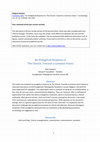
The author has prepared an evangelical response to The Church: Towards a Common Vision based on c... more The author has prepared an evangelical response to The Church: Towards a Common Vision based on classroom discussions at the Evangelische Theologische Faculteit in Leuven, Belgium, and with the kind cooperation of colleagues. The respondents have no authority to speak for an ecclesial family. In fact, they do not even share a denominational allegiance. They can, however, offer a multilayered appreciation from within the diverse evangelical movement, which is characterized by a shared spirituality. After general remarks, Faith and Order's second convergence document is discussed from conversionist, restorationist and revivalist perspectives. While opinions on the document diverge, there is a general appreciation for the work of Faith and Order. It is explained how the document challenges the evangelical movement to critical self-reflection. Particular theological emphases of the evangelical movement that can contribute to the developing ecumenical ecclesiology are suggested as well.
Catholicity under Pressure: The Ambiguous Relationship between Diversity and Unity (Proceedings of the 18th Academic Consultation of the Societas Oecumenica), 2016
Trajecta: Religion, Culture and Society in the Low Countries 24, 2015
Written and oral discourse in Evangelical free churches in Belgium until the mid-1980’s mostly co... more Written and oral discourse in Evangelical free churches in Belgium until the mid-1980’s mostly considered their independence of the State as self-evident. This changed drastically in less than two decades. By 2003, hundreds of Evangelical free churches were incorporated in an
administrative council which de facto represents Belgian ‘Protestantism’ to the State and which channels different forms
of support for their religious activities. This article indicates divergences in discourse and praxis regarding State support for
ministers in Evangelical free churches in Belgium between 1987 and today, against the backdrop of the history of Protestantism
in Belgium in relation to the State.

Journal of the European Pentecostal Theological Association 35/1, p. 58-68, Apr 2015
The theological themes and ecumenical methods which dominate current ecumenical discourse reflect... more The theological themes and ecumenical methods which dominate current ecumenical discourse reflect the preferences of the traditions long active in the movement. This poses a serious challenge to the growing participation of the Pentecostal and Evangelical sections of Christianity in ecumenical dialogues.
Their integration demands not only that they learn to step into this history, but also that their spiritual and theological particularities carry weight in the further development of ecumenical theology. Four decades of International Roman Catholic–Classical Pentecostal Dialogue demonstrate how courageous choices regarding themes, dialogue method and theological method can mature and bear fruit. It teaches new partners in the ecumenical dance not to simply copy the rhythms and moves of their dialogue partners, but to dance to the beat of their own drums.
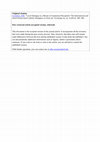
Exchange 42/4 (2013)
The International Roman Catholic-Classical Pentecostal Dialogue, established in 1972, encourages ... more The International Roman Catholic-Classical Pentecostal Dialogue, established in 1972, encourages the initiation of local Pentecostal-Catholic dialogues. Such dialogues are deemed important to get feedback from the grassroots and to promote reception of the IRCCPD’s ecumenical achievements. The Catholic-Pentecostal dialogue in the Netherlands (1999-2009) is arguably to date the prime example of such a local spin-off and its history evidences strong ties with the international dialogue. The desired feedback to the international level was virtually absent, but the usefulness of the IRCCPD’s Final Reports for the local context was acknowledged and the Dutch dialogue was considered locally fruitful. The local context is however constantly changing and in order to deal with the issues deemed most important by both dialogue partners, a reconfiguration of the Dutch dialogue involving a third partner has been prepared since 2009. As the dialogue is no ‘official’ spin-off of the IRCCPD, chances are high that the ties with the international dialogue will soon be severed.
Pathways for Ecclesial Dialog. Revisiting Ecumenical Method
Published in: One in Christ 46 (2011).

Ecclesiology, Jan 1, 2009
Th e offi cial dialogue between the Roman Catholic Church and Classical Pentecostal representativ... more Th e offi cial dialogue between the Roman Catholic Church and Classical Pentecostal representatives is the only substantial bilateral dialogue between a historic church and a 'young' spiritual movement. In view of the challenge of ecumenism in the twentyfi rst century to incorporate new expressions of Christian community life into the ecumenical movement, this dialogue off ers us an interesting test case. Since its establishment in 1972, it has gone through fi ve phases of dialoguing, each lasting fi ve to nine years. Both the Final Reports on each phase and the comments given by participants and observers throughout the last 35 years show the inner dynamic of this unique dialogue. It was based on a simple friendship and started as a long series of exploratory meetings with little theological but much relational gain. Yet slowly but surely it evolved into a strong dialogue that is characterised by a recognition of spiritual unity, a deep mutual respect, and an ability of honest self-criticism, teaching us that the new ecumenism requires the basis of a loving relationship and courage to leave the welltrodden paths.
Verschenen in: Pieter Boersema e.a. (red.). Gezag in beweging. Kerkelijk leiderschap tussen tekst... more Verschenen in: Pieter Boersema e.a. (red.). Gezag in beweging. Kerkelijk leiderschap tussen tekst en context. Heerenveen: Protestantse Pers, 2008, 19-36.
Papers by Jelle Creemers
Ecclesiology, May 9, 2014
The Vitality of Evangelical Theology

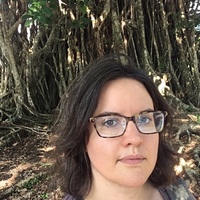

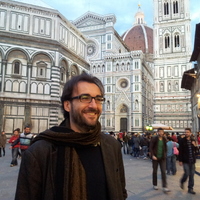


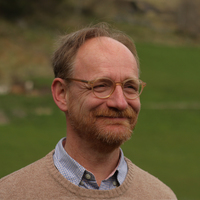


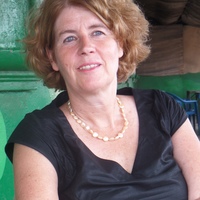

Uploads
Books by Jelle Creemers
After providing an ecumenical profile of the Classical Pentecostal dialogue partner, Creemers demonstrates how fair representation of the Classical Pentecostal movement has been pursued in the course of the dialogue. Next, he gives attention to the ecumenical method of the IRCCPD. First, the development of a dialogue method hinging on “hard questions” is traced, which has allowed a balanced theological exchange between the dialogue partners. Regarding theological method, it is demonstrated that both partners showed a willingness to experiment together by integrating sources of theological knowledge typically distrusted in their own traditions. In conclusion, the analyses are integrated in an overview of challenges and opportunities for dialogue with the Classical Pentecostal movement in the context of ongoing discussions on ecumenical method.
TABLE OF CONTENTS
Abbreviations
Chapter 1: INTRODUCTION
PART A CLASSICAL PENTECOSTALS IN ECUMENICAL DIALOGUE
Chapter 2: An Ecumenical Profile of Classical Pentecostalism
Chapter 3: The Intertwined Challenges of Representation and Reception
PART B ECUMENICAL DIALOGUE WITH CLASSICAL PENTECOSTALS 175
Chapter 4: Dialogue Method in the IRCCPD: The Hard Questions Method
Chapter 5: Theological Method in the IRCCPD: Experimenting Together
Chapter 6: Dialogue With Classical Pentecostalism: Challenges and Opportunities
Appendix: Participants Pentecostal Dialogue Team Phases I-V
Sources and Bibliography
REVIEWS
“This is definitely the most in-depth study on methodological issues related to 35 years of international ecumenical dialogue between the Roman Catholic church and Classical Pentecostalism. A careful study of the final reports of each dialogue phase makes it clear that, once the unique dialogue method of raising and answering to hard questions was firmly established, the theological quality of the dialogue could benefit. The discovery that a rich variety of theological sources has been used in the final reports allows for fruitful comparison with other bilateral dialogues.” – Peter de Mey, Catholic University of Leuven, Belgium
“The International Roman Catholic-Classical Pentecostal Dialogue is a remarkable discussion that has already enjoyed over four decades of existence. Creemers has written what I believe is the single most significant study of this dialogue to date. He places the dialogue within the larger ecumenical context and demonstrates its value on a number of fronts. His examination of the unique methodology employing "hard questions" in this dialogue is unparalleled and it points to their significance as yet another tool that can aid in the continuing development in the field of ecumenics. This is a valuable contribution to those seeking information on the two largest Christian families in the world, to professional ecumenists who are interested in documentation, and to students.” – Cecil M. Robeck, Jr., Fuller Theological Seminary, USA
Articles by Jelle Creemers
process, which ultimately resulted in the establishment of the FS, because they saw it as a battle for orthodoxy and as an opening
for evangelization. Second, the article makes
the case that the process of establishing the Synod cannot be considered as an inner-Evangelical development, even if the FS has
an almost exclusively Evangelical membership. Rather, it argues, the Synod must be understood as an inner-Protestant matter,
involving negotiations with the United Protestant Church in Belgium (UPCB) and with other Protestant churches, as well as with
the State. For, in fact, the process purposely aimed at breaking (what was perceived by Evangelical leaders as) the monopoly of the UPCB regarding particular privileges given by the State to the officially recognized religion of Protestantism.
This article aims to exhibit negotiation strategies of Free Church Evangelicals seeking access to benefits provided by the Belgian State. Making use of a categorization analysis, it will be highlighted how those lacking social power can assume agency by positively making use of 'strategic self-categorization', a term adapted from Gayatri Spivak's work. The analysis will reveal how representatives of the amalgam of Belgian Evangelical free churches have strategically self-identified in their relation to other Protestants and to the State in written communications to the secular authorities in the 1990's. The choices that were made to present themselves explicitly as Protestants – or not – are interpreted in the context of the Protestant landscape and the Religion-State arrangements in Belgium.
administrative council which de facto represents Belgian ‘Protestantism’ to the State and which channels different forms
of support for their religious activities. This article indicates divergences in discourse and praxis regarding State support for
ministers in Evangelical free churches in Belgium between 1987 and today, against the backdrop of the history of Protestantism
in Belgium in relation to the State.
Their integration demands not only that they learn to step into this history, but also that their spiritual and theological particularities carry weight in the further development of ecumenical theology. Four decades of International Roman Catholic–Classical Pentecostal Dialogue demonstrate how courageous choices regarding themes, dialogue method and theological method can mature and bear fruit. It teaches new partners in the ecumenical dance not to simply copy the rhythms and moves of their dialogue partners, but to dance to the beat of their own drums.
Papers by Jelle Creemers
After providing an ecumenical profile of the Classical Pentecostal dialogue partner, Creemers demonstrates how fair representation of the Classical Pentecostal movement has been pursued in the course of the dialogue. Next, he gives attention to the ecumenical method of the IRCCPD. First, the development of a dialogue method hinging on “hard questions” is traced, which has allowed a balanced theological exchange between the dialogue partners. Regarding theological method, it is demonstrated that both partners showed a willingness to experiment together by integrating sources of theological knowledge typically distrusted in their own traditions. In conclusion, the analyses are integrated in an overview of challenges and opportunities for dialogue with the Classical Pentecostal movement in the context of ongoing discussions on ecumenical method.
TABLE OF CONTENTS
Abbreviations
Chapter 1: INTRODUCTION
PART A CLASSICAL PENTECOSTALS IN ECUMENICAL DIALOGUE
Chapter 2: An Ecumenical Profile of Classical Pentecostalism
Chapter 3: The Intertwined Challenges of Representation and Reception
PART B ECUMENICAL DIALOGUE WITH CLASSICAL PENTECOSTALS 175
Chapter 4: Dialogue Method in the IRCCPD: The Hard Questions Method
Chapter 5: Theological Method in the IRCCPD: Experimenting Together
Chapter 6: Dialogue With Classical Pentecostalism: Challenges and Opportunities
Appendix: Participants Pentecostal Dialogue Team Phases I-V
Sources and Bibliography
REVIEWS
“This is definitely the most in-depth study on methodological issues related to 35 years of international ecumenical dialogue between the Roman Catholic church and Classical Pentecostalism. A careful study of the final reports of each dialogue phase makes it clear that, once the unique dialogue method of raising and answering to hard questions was firmly established, the theological quality of the dialogue could benefit. The discovery that a rich variety of theological sources has been used in the final reports allows for fruitful comparison with other bilateral dialogues.” – Peter de Mey, Catholic University of Leuven, Belgium
“The International Roman Catholic-Classical Pentecostal Dialogue is a remarkable discussion that has already enjoyed over four decades of existence. Creemers has written what I believe is the single most significant study of this dialogue to date. He places the dialogue within the larger ecumenical context and demonstrates its value on a number of fronts. His examination of the unique methodology employing "hard questions" in this dialogue is unparalleled and it points to their significance as yet another tool that can aid in the continuing development in the field of ecumenics. This is a valuable contribution to those seeking information on the two largest Christian families in the world, to professional ecumenists who are interested in documentation, and to students.” – Cecil M. Robeck, Jr., Fuller Theological Seminary, USA
process, which ultimately resulted in the establishment of the FS, because they saw it as a battle for orthodoxy and as an opening
for evangelization. Second, the article makes
the case that the process of establishing the Synod cannot be considered as an inner-Evangelical development, even if the FS has
an almost exclusively Evangelical membership. Rather, it argues, the Synod must be understood as an inner-Protestant matter,
involving negotiations with the United Protestant Church in Belgium (UPCB) and with other Protestant churches, as well as with
the State. For, in fact, the process purposely aimed at breaking (what was perceived by Evangelical leaders as) the monopoly of the UPCB regarding particular privileges given by the State to the officially recognized religion of Protestantism.
This article aims to exhibit negotiation strategies of Free Church Evangelicals seeking access to benefits provided by the Belgian State. Making use of a categorization analysis, it will be highlighted how those lacking social power can assume agency by positively making use of 'strategic self-categorization', a term adapted from Gayatri Spivak's work. The analysis will reveal how representatives of the amalgam of Belgian Evangelical free churches have strategically self-identified in their relation to other Protestants and to the State in written communications to the secular authorities in the 1990's. The choices that were made to present themselves explicitly as Protestants – or not – are interpreted in the context of the Protestant landscape and the Religion-State arrangements in Belgium.
administrative council which de facto represents Belgian ‘Protestantism’ to the State and which channels different forms
of support for their religious activities. This article indicates divergences in discourse and praxis regarding State support for
ministers in Evangelical free churches in Belgium between 1987 and today, against the backdrop of the history of Protestantism
in Belgium in relation to the State.
Their integration demands not only that they learn to step into this history, but also that their spiritual and theological particularities carry weight in the further development of ecumenical theology. Four decades of International Roman Catholic–Classical Pentecostal Dialogue demonstrate how courageous choices regarding themes, dialogue method and theological method can mature and bear fruit. It teaches new partners in the ecumenical dance not to simply copy the rhythms and moves of their dialogue partners, but to dance to the beat of their own drums.